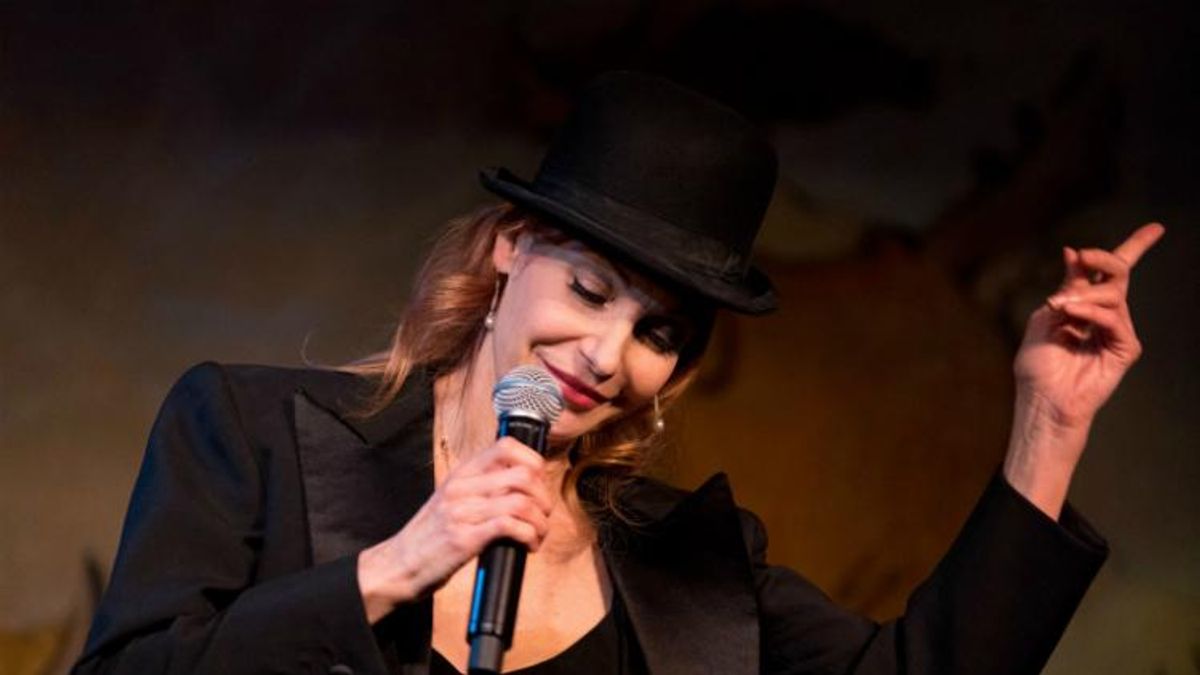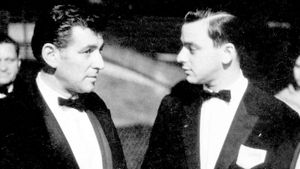Ute Lemper is back in Weimar--psychologically, at least. The musician who came to fame playing Sally Bowles in the original Paris production of Cabaret, for which she won a Moliere Award, and then gained great acclaim with her immaculate renditions of Kurt Weill's song catalog, is in residence at New York's elegant Cafe Carlyle until March 3, where she'll perform songs associated with Marlene Dietrich, from her early Weimar years to her experiences in exile, singing for American troops during World War Two, and her later collaborations with the great Burt Bacharach. Inspired by a three-hour phone conversation between Lemper and Dietrich some 30 years ago, the show unrolls as a series of musings on the legend's life and philosophy, and the ways in which it has illuminated Lemper's own journey. Although she has resisted various overtures to play Dietrich over the years, Lemper considers her 90-minute performance as an homage rather than an imitation in which that long-ago conversation between a mentor and an ingenue is center stage. The chanteuse took time out of rehearsals to talk about her relationship with the legend, and why it took Germany so long to move beyond its resentment to finally embrace one of its greatest artists.
Dietrich feels like a perfect match for your talents, and a compliment to your Kurt Weil and Cabaret recordings.
Marlene Dietrich has been a phenomenon in my life--I've always been compared to her and felt weird about it. In the last year, three separate theater projects were brought to me in which I was to play Dietrich. One was about the relationship between Marlene and the French actor, Jean Gabin; another was about the relationship between Marlene and Edith Piaf; and the third was a theater show that was written ten or 15 years ago. I said no to all of them. But it's so funny when you just listen to your inner voice and let it speak without censoring it, and once I did that I realized that I had my own show about Marlene to write, and that it had to be very personal, because I did not want to impersonate her--that's always way too stereotyped and stylized. It had to be a dramatized conversation between the two of us.
And this is the conversation you had early in your career?
Yes, it goes back to 1988 when I lived in Paris and performed the musical, Cabaret, and won a French Tony award. She was still alive, living in Avenue Montaigne in Paris. The press was busy comparing me to her, and I felt embarrassed and wrote her a letter to express my admiration and thankfulness. A month later she called me and we had a three-hour conversation, 30 years ago, that took me a very long time to digest. She spoke a lot, about everything big and deep and sad and beautiful in her life. I kept this kind of secret and carried it with me, but I get into detail in the show about the different aspect of the conversation, which of course went through many, many chapters of her life--the German time, the Nazi time, her time as an American soldier, her time in Hollywood, her affinity for the poet Rilke, and the very sad relationship with her daughter, who then wrote a book about her after she passed away. The book was already written when we spoke, and Marlene told me her daughter was waiting for her death to publish it. I wish I could have the conversation now, because then I was only 24, but this show is based on that phone call, and then elaborates throughout her life--the things she told me, with songs slipped in, but not necessarily in her style.

When one think sof your music, what speaks loudest is how rooted you are in text, whether the poetry of Pablo Neruda, or the lyrics of Kurt Weil. Do you see a comparison there with Dietrich's highly articulated renderings of song.
Very much, there are moments when the line between her and me is so fine that you can't say who is speaking. There are a lot of parallels, but also, I have to say, there is a lot in the story of her life that I'm compelled by. She's an expatriate who has a huge pain in her chest about her story with Germany, and the fact that she was treated as a traitor after the war, and yet she proud of her cultural heritage, and her way of approaching life was very German in itself. She passed away in 1992, when I was in rehearsal for The Blue Angel in Berlin, playing Lola. She died six days before the opening night, and was buried in Berlin. I was at the funeral and put a rose on her grave. There were people who threw stink bombs on her grave. The people in the neighborhood where she lived in the 1920s, refused to let the street be renamed after her. It wasn't for another ten years, in 2001, on the 100-year anniversary of her birth, that was she finally celebrated. Throughout my life, I've seen that the cycle closes so much later than expected--it took the Germans until 2005 to create a Holocaust Memorial in Berlin, almost 20 years after the fall of the Wall. Last year I created a show, Songs for Eternity, that are by the Jewish composers who were incarcerated and then murdered, people like Victor Ullman who was a contemporary of Kurt Weill, and composed to the very end in the Theresienstadt concentration camp, until they threw him on the train to Auschwitz. For me, I continually see that I am closing cycles on stories that I tell, and Dietrich had something similar. I'm captivated by her.
So many people disengage from the Nazi era, but Marlene did not, and you do not.
Not only did she not disengage, she joined the American army--she was on the front line. She was singing for the enemy, so if she'd been caught she would have ended up in the concentration camp, too. She took a great risk for her ethics and beliefs, apart from enjoying singing for all these guys. It's been a subject that has haunted me all my life. Even before I was 20 and I wrote my first Kurt Weill evening recital and it felt important to tell his life story, not to simply sing the songs, to talk about how this musical innovator was treated, insulted, had his scripts and music burned, and left Germany for America where he didn't even want to speak German anymore, so much pain did he feel about what the Nazis had done. I was born in 1963, not even 20 years after the war. It was a Germany with so many open wounds.
You've performed at a dinner for Barack Obama and Angela Merkel. What was that experience like?
Well, I like Angela Merkel very much--at the beginning I was very suspicious of her because she was a prodigy of Helmut Kohl, a conservative politician who called himself a unification chancellor. He was not my kind of guy at all and I didn't like his politics, but I think what she has achieved over so many years is wonderful. She has a directness about her. She's educated, she's an intellectual, but she also thinks with her heart. It's not in her interest to win elections by lying. It might have to do with the fact that she is, after all, a woman. I liked Obama and it was horrible to have witnessed over the eight years how Republicans tried to demonize him--the criticism was horrendous; it was a no-win for him, but looking back I think, 'My god, what an ethical man to have as president.'

In this profound #metoo moment I wonder what you think we can learn from the way Marlene Dietrich conducted her life, given that she appeared so much in possession of herself, so strong.
Billy Wilder described her as a great guy to hang out with--and that was basically how she approached her life, as an equal to the men around her. She was very progressive in her femininity. She did not at all fulfill the romantic ideals of the woman of the time--she was never a servant to the man. She liked a good smoke and a good drink, and she saw love for what it was--you respect the person's solitude and protect it, and she had a very modern marriage with her husband, in which they had an open marriage. She had her leading men lovers, and she liked to conquer them and to explore them and to find their essence, and then she moved on. And she made no distinction between men and women, as long as she found them attractive. She had women lovers and men lovers, plenty of them, and she stayed friends with most of them.
What song will you be performing at the Carlyle?
I start in the Weimer republic, that Berlin I know very well from my other performances, and period of The Blue Angel, from 1928, which established her internationally, and then her war years--"Lili Marlene." will be in it; her experiences in 1950 with Hitchcock and Cole Porter--the good smooth songs like"One for my Baby," Frank Sinatra stuff, but also important peace songs like "Where Have All the Flowers Gone," and her cover of Bob Dylan's "Blowing in the Wind," in German and English, and then her collaboration with Burt Bacharach, which was very important. He was her arranger, her composer, her musical director, her pianist, for 15 years. He was still a young man, and she took a little bit of convincing, but he stayed with her for many years--she was 20 years old. I'm sure they also had an affair. I play the arrangement he made for her of "I've Grown Accustomed to Her Face," by Frederick Loewe and Alan Jay Lerner. And the later songs--"Just a Gigolo," from her last movie--but also the French songs she loved so much. It's more of a personal portrait of mine to her, an homage. Ideally it would be an off-Broadway show--it's a play with music--but I just want to get my first grip on it in this very small, glamorous room, and feel it out.
You wrote a musical project about Charles Bukowski, who's family came from Germany in the 1920s. Do you have a particular fascination with the experience of the immigrant and the exile?
I am an immigrant--I left Germany for Austria, and then to Paris in 1987 to perform, and then to London, and after that I was only sporadically back in Germany. My first two children were born in Paris, and they always had two passports. I've lived in New York for the last 20 years. I have to say that I love Germany--it's wonderful to do tours there. It just has a different integrity there. Nothing is sold just purely for the money, as it is here, and people are very, very straightforward, and have good morals beyond the movement of nationalism and populism that we see everywhere, but still the country has a past that should not be forgotten, and I'm just one of the worms that will not let anyone forget it.
Ute Lemper is at Cafe Carlyle until Saturday 3 March, with performance at 8:45pm. Reservations can be made by phone at 212.744.1600 or online via Ticketweb.


























































































